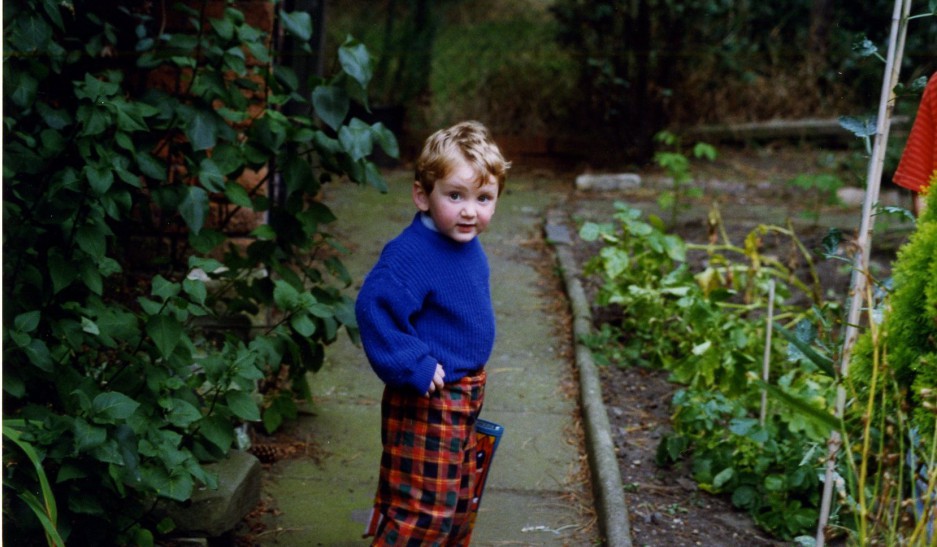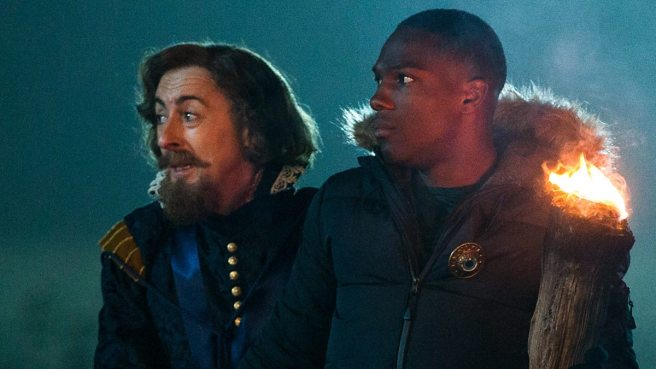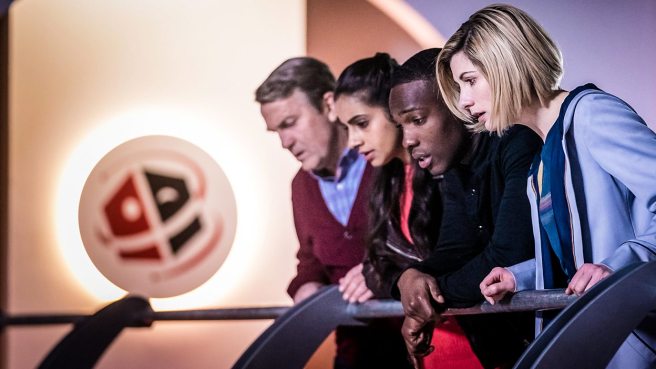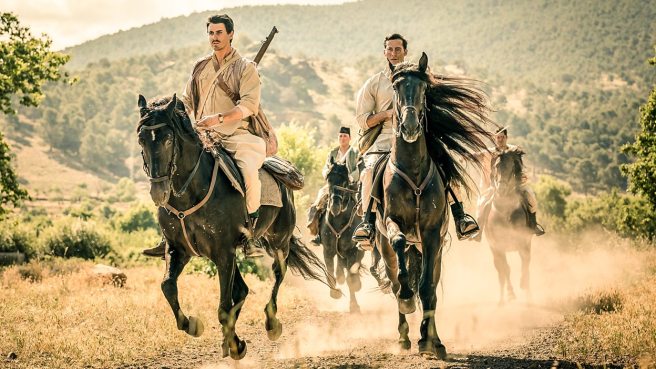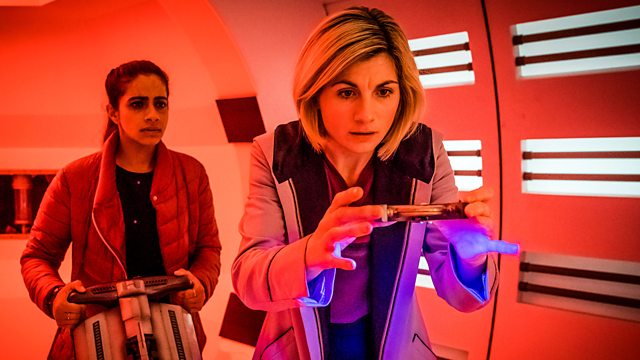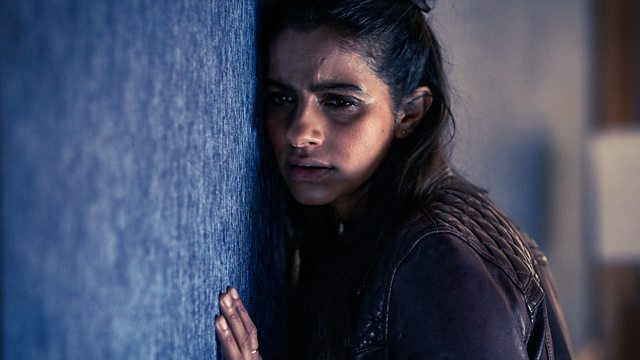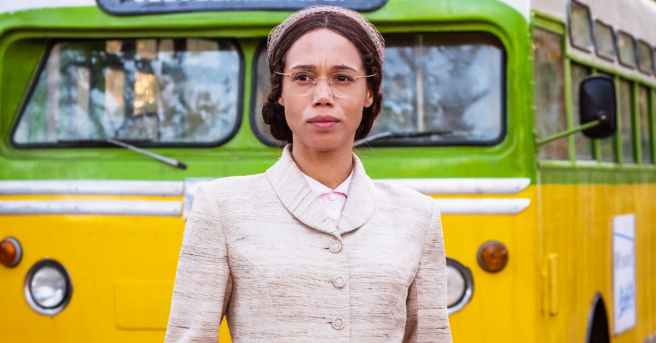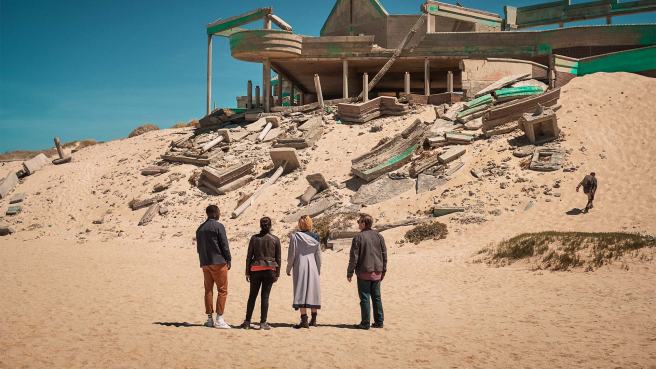The first New Year’s Day special of Doctor Who since 1st January 1966’s Volcano featured a 30-second scene set on New Year’s Eve for the simple reason that it could, Resolution has a fitting title in a number of ways. It makes for a refreshing beginning to 2019, because its mix of a spectacular standalone adventure with more profound developments for Ryan makes it a much more satisfying resolution to this series just gone than we had been given three weeks before.
One big disappointment of series finale The Battle of Ranskoor Av Koloss was the loose thread of Ryan’s strained relationship with his father, dangled before us from episode one then left hanging. Here, we finally see the elephant in the room addressed, as Aaron (Daniel Adegboyega) arrives on the scene. A deadbeat Del Boy, similar to our first impression of Pete Tyler in 2005, Aaron’s character progresses differently – thanks not only to still being alive, but to the presence of the family’s next generation up in Graham.
We see Aaron from Ryan’s perspective first, all lame excuses for skipping Grace’s funeral, nothing to redeem him for his perpetual absence. It takes a talk from Graham to finally invoke some sympathy, by putting him in Ryan’s position. Where Ryan has been a son without a parent’s love, Aaron has taken his mother’s for granted. He sees an abundance of it when Graham shows him all his childhood belongings Grace kept – too late to undo his neglect of the relationship. The final showdown sees Ryan save him from danger, and a redemptive story for Aaron would need this to have been the other way round. But we at least leave with the way paved to explore their relationship next year, perhaps see it rebuilt.
Aaron and Ryan’s story is kick-started in those two key scenes, so an engaging new character is introduced with impressive economy. The same is true of Lin (Charlotte Ritchie) and Mitch (Nikesh Patel). Their romance isn’t the most original story, but for a ‘festive blockbuster’ like this, it’s all the episode needs. We like them straight away, and we feel for them, especially when it seems they might not both make it to the end. Similarly, the security guard (Connor Calland) killed on duty feels like a fully formed person within a handful of lines. We get a sinking feeling when his body is being used as a tool just seconds later – an example of the episode’s fantastic success in restoring a sense of dread to the Daleks.
Taking centre-stage for the first time in three years, it’s great to see them back. For the most part, Chris Chibnall sensibly treats them in ways often adopted when reviving them. We see it impotent at first, only for it to manipulate others and restore itself to terrifying power (see 1966’s The Power of the Daleks and 2005’s Dalek). We’re shown an especially gruesome mutant slithering up a wall, then leeching onto its host’s body and taking control. It’s the first time we’ve seen a Dalek physically possess someone, and it succeeds not least because of Charlotte Ritchie’s fantastic performance as Lin. Humanity emerges just often enough for us to know she’s still alive in there – all the more unsettling to watch.
For one episode only, we’re also given a new ‘scrapheap’ design for the Dalek. I’d have liked it to be dirtier and tattier still, but it works – even if the missiles are a bit silly. The sequence where the Dalek instructs Lin as she builds the casing also creates a visual parallel to the Doctor building her sonic screwdriver in The Woman Who Fell to Earth. This could have been developed further, and unlike previous confrontations, there isn’t such a personal connection felt between the Doctor and the Daleks. Jodie Whittaker is never less than fantastic, but a conflict like this can be invaluable for distinguishing a Doctor’s character, and here it feels like an opportunity for drama not taken.
Other moments feel like that too, with misdirected attention and unnecessary emphasis working against the story. The UNIT scene allows for a Brexit joke that could have been quicker, and the thrust of the scene otherwise is to show the Doctor and friends are fighting alone. But I wasn’t waiting for UNIT to show up. I imagine they hadn’t crossed the minds of most people watching. The scene wastes time. Meanwhile, growing piles of dead police officers and security breaches give reason for a confrontation between the Dalek and the army, yet that sequence feels out of the blue. It misses a beat of escalation. Perhaps the Doctor and friends could meet them too, try to help them, and go ignored ahead of the ensuing massacre – not a bad way to show they’re fighting alone.
Similarly, elements are left hanging loose from an impressive prologue. That the Dalek teleports itself back together from around the world isn’t made especially clear, so the other two locations established feel strangely abandoned. The same is true for the ancient society of custodians, set up and then given occasional lip service. The prologue adds scale, but it harks back to the Moffat era – complex, frenetic storytelling, with an epic, sprawling plot. But Chris Chibnall’s great skills, seen here and elsewhere, lie more in good, down to Earth, character-driven stories, for a wider ensemble cast. Scale could still be given in a way that plays to those skills, but missteps here work against him.
All that said, Chibnall’s talents are still on good display in Resolution, and it’s a satisfying story for our characters. The path to reconciliation between Ryan and Aaron has been opened up, Mitch and Lin’s love story reaches the conclusion we want, and the Doctor and friends head off wide-eyed on new adventures. Imperfections aside, this was a great piece of adventure TV for the holiday season, and provides a much more enjoyable end to the series than I thought we’d had. The appetite is suitably whetted for series 12… in 2020.

